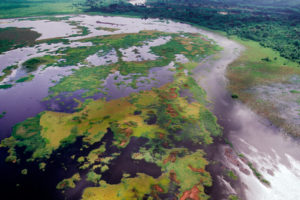Many are wondering – more than usual – about whether they will be able to start or sustain a career in nature conservation. Yet supporting conservation and conservationists is more critical now than ever.
Nature underpins all of society through the services it provides, not least clean air, healthy food, and fresh water. Despite the importance of conserving nature, those who have dedicated their lives to conservation are facing unprecedented challenges during this global pandemic. Along with health fears, concerns for loved ones, and the effects of isolation, current and future conservation champions are at risk of being left behind, right when their voices need to be heard and their activities prioritised.
This was supposed to be the ‘super year’ for nature

An aerial view of one of the many wetlands found in Nicaragua. Credit: Juan Pablo Moreiras, Fauna and Flora International
Before the pandemic, we were focused on 2020 and the anticipated new global commitments on addressing biodiversity loss, climate change, and regulation of the high seas. Currently all related meetings are postponed, but we cannot afford to lose the momentum and political awareness that has been built.
As of April 2020, jobs and internship opportunities in nature conservation worldwide appear to have halved. Cutbacks and hiring freezes will inevitably have knock on impacts to the real-world conservation outcomes we desperately need, from losing voices in the global policy arena, to fewer patrol rangers preventing poaching, which unfortunately is already increasing during this time. While purse strings tighten around the globe, organisations dependent on ecotourism are seeing their funds decrease, and others fear the reallocation of government grants and reductions in charitable donations.
Philanthropy that supports conservation will help prevent future pandemics
The global response to the pandemic has clearly demonstrated the need for collective action to address the global biodiversity and climate crises. Importantly, many funders are now applying a climate lens to all of their giving. The conservation of nature, and subsequently biodiversity, should form a key part of these conversations. Efforts to prevent habitat destruction, restore ecosystems and promote more sustainable lifestyles remain essential to prevent ecological collapse, which is a key factor in the outbreak of zoonotic diseases.
An exercise in listening
Many valuable discussions and perspectives are being shared about ways to make sure that conservation organisations and conservationists have the chance to continue their essential work. Here are some we have seen so far:
- The crisis has served to highlight the value of locally led conservation rather than ‘helicopter science’, with the dual advantages of empowering those best placed to benefit from and deliver conservation outcomes, and a reduction in the carbon footprints of conservation projects.
- Some international conservation organisations are establishing proactive, rapid response initiatives to support their local partners, which is made easier by funders offering flexibility and fast decision-making.
- A spotlight has been shown on our unhealthy relationship with nature with organisations coming together to rally against unsustainable wildlife trade and advise governments on how to respond.
- Funders are providing much needed health, financial, and other vital support as part of their long term relationships with conservation partners, acknowledging that people living in the most biodiverse corners of the globe are often also the most vulnerable.
- Campaigners are reinventing lobbying activities, and we can help by amplifying their messages, such as efforts to build fisheries back better post Covid and by standing up for land and environmental defenders.
- Early career conservationists and those who depend on temporary or short-term jobs in the field will be hit the hardest. Funders should keep this in mind, along with the wide-ranging impacts on the collection of long term field datasets.
- Finally, acknowledging root causes of the crisis and the links between biodiversity and human rights is going to be key.
Fortunately, Arcadia will continue to support our partners despite the current chaos in financial markets, alongside many other foundations and social entrepreneurs. Healthy societies rely on healthy ecosystems, and support for conservationists is essential in this time of uncertainty, and into the future.
Emma McIntosh and Francesca McGrath are Environmental Grants Managers at Arcadia.








Comments (0)